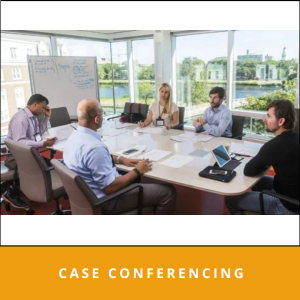Case Conferencing
 About this Training
About this Training
In the work of ending homelessness, service providers, both systemically and organizationally, will reach points where the pathway forward seems blurry or obstructed by a variety of seemingly insurmountable obstacles. During such times, support personnel may experience feelings of helplessness and despair, potentially leading to staff trauma and burnout. It is crucial to counteract this by accessing the expertise and insights of the wide-ranging network of connections and partners in the community who are capable of providing suggestions or assistance in tackling the underlying challenges. Case conferencing emerges as a pivotal tool in addressing this issue, facilitating the development of new or enhanced strategies for assisting individuals in securing housing, accessing essential services, and fostering personal growth through a recovery-oriented approach.
| Instructor Led (In-person and virtual options) |
|
Training Audience: This training is appropriate for:
Training can be tailored according to attendees and the community or system involved. Note – The TTA requests that all training include at a minimum, one member of leadership from each organization/agency represented, be present as a learner. |
|
Training Length: In-Person (preferred): 1 day (8 hrs) |
|
Training Capacity: In-Person: 40 maximum / 8 Minimum |
|
Training Objectives: In this training, participants will:
|
|
Training Prerequisite Onboarding Modules: Mandatory: None |
|
Certificate of Completion: Through the TTA LMs, attendees will have the ability to receive a certificate of completion for the training . Attendees must be present for the full training to do so. To receive a certificate, attendees must complete and pass a final knowledge check/assessment (within 30 days post-training).
|
|
Training Costs: Please inquire using the “Request More Info” button to the right regarding fees. Please note that all fees quoted should be considered an “all-inclusive” cost which means there would be not additionl costs for travel, prep, admin, or other items added to the rate provided to you with the exception of provincial tax. Members: A system, community, or organization can become a “Member” by purchasing an annual subscription to self-paced online onboarding modules. Discounts on live training are available determined by the subscription package chosen. (See “Onboarding Module” section here). |
Case conferencing is a recurring, problem-solving meeting, which brings key stakeholders together to collaborate on ways to remove barriers to help house participants faster and support participants better. It can be part of a systems approach like a coordinated access system through a real-time by-name list or be part of an organizational (primarily Intensive Case Management) effort to coordinate resources and support, strengthen, and stabilize the housing and recovery process.
This training is designed to assist systems or individual programs to either improve their existing case conferencing process or gain the tools and knowledge necessary to create an effective one. Attendees will work together using various tools and strategies to understand the process and how to make these meetings as efficient and impactful as possible. The last thing people need is another time-sucking meeting that is generally not helpful. Therefore, you must ensure that this process is a positive experience for all in attendance and those receiving the support.
